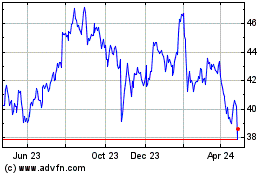Comcast Argues High Court Should Quash Discrimination Suit
November 13 2019 - 4:09PM
Dow Jones News
By Jess Bravin
WASHINGTON -- Comcast Corp., seeking to quash a discrimination
suit filed by a black television producer, faced a skeptical
Supreme Court at Wednesday arguments, where several justices
suggested there was enough in Byron Allen's allegations to get his
case into court.
Mr. Allen, who gained celebrity as co-host of "Real People," a
1980s reality show, filed the suit after the cable giant refused to
carry Pet.TV, Recipes.TV and other channels produced by the company
he owns, Entertainment Studios Networks Inc.
Comcast's attorney, Miguel Estrada, told the high court the suit
should be dismissed because it contained insufficient evidence that
Mr. Allen's channels were rejected because he is black.
What Mr. Allen did allege -- that race was a "motivating factor"
in Comcast's decision -- simply wasn't enough to justify a lawsuit,
Mr. Estrada said.
Justice Sonia Sotomayor disagreed.
"I think as long as you have enough in your complaint to show
racial animus and a reasonable inference can be drawn that that's a
but-for cause," -- in other words, but for Mr. Allen being black,
the contract would have been made -- "I think a plaintiff has done
more than enough," she said.
Said Justice Brett Kavanaugh: "It's pretty rare, at least in my
years of looking at discrimination complaints, it's pretty rare to
throw one out at the [pleading] stage."
Justice Ruth Bader Ginsburg was absent Wednesday; a court
spokeswoman said the 86-year-old cancer survivor was home with a
stomach bug. Chief Justice John Roberts said Justice Ginsburg would
participate in the case by reading briefs and transcripts.
Mr. Allen sued under a Reconstruction-era law that provides "all
persons" the right to make and enforce contracts "as is enjoyed by
white persons."
He claims that Comcast strung him along for eight years but
ultimately refused to carry his channels; the complaint claims a
Comcast executive said, "We're not trying to create any more Bob
Johnsons," referring to the African American founder of Black
Entertainment Television.
Comcast denies the allegations, observing that it not only
carried BET, which was sold in 2001 to Viacom, but other channels
with substantial African-American ownership, such as Magic
Johnson's Aspire and Sean "Diddy" Combs's music channel, Revolt
TV.
"It is much harder to allege and prove but-for causation than to
allege that race is a motivating factor," said Mr. Allen's
attorney, Erwin Chemerinsky, who is dean of the University of
California, Berkeley, School of Law.
Only after discovery should the plaintiff be expected to
introduce enough facts to demonstrate that race was the deciding
element in a race-discrimination case, he said. At that point, he
said, the plaintiff should be required to prove that claim, an
argument on which some justices pushed back.
A decision in the case, Comcast Corp. v. National Association of
African American-Owned Media, is expected by June.
Write to Jess Bravin at jess.bravin@wsj.com
(END) Dow Jones Newswires
November 13, 2019 15:54 ET (20:54 GMT)
Copyright (c) 2019 Dow Jones & Company, Inc.
Comcast (NASDAQ:CMCSA)
Historical Stock Chart
From Apr 2024 to May 2024

Comcast (NASDAQ:CMCSA)
Historical Stock Chart
From May 2023 to May 2024
